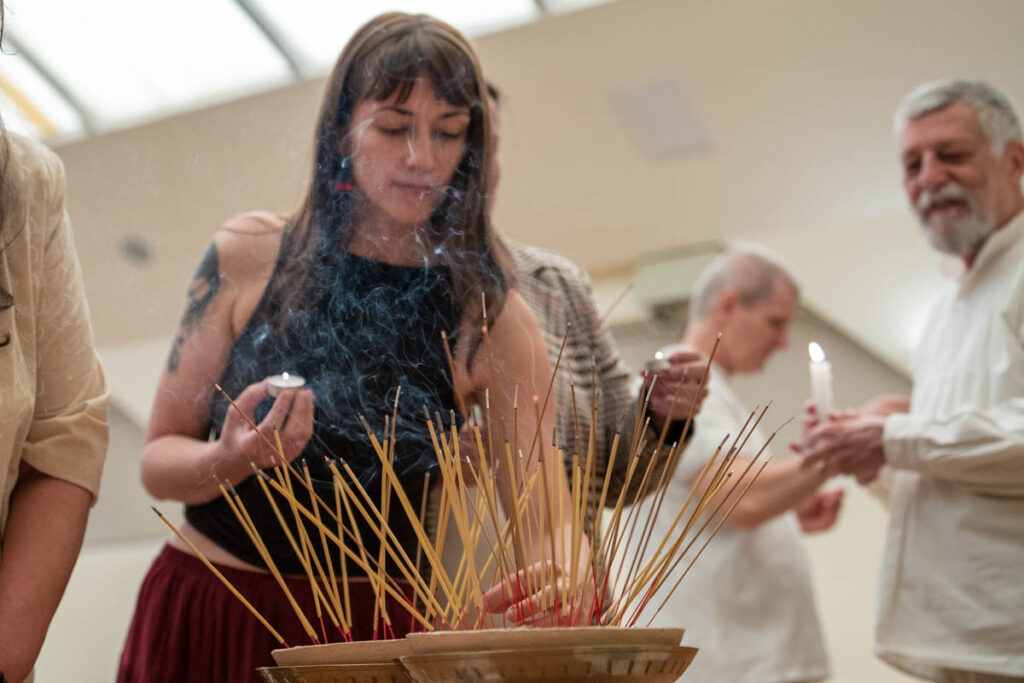
- Featured news, News

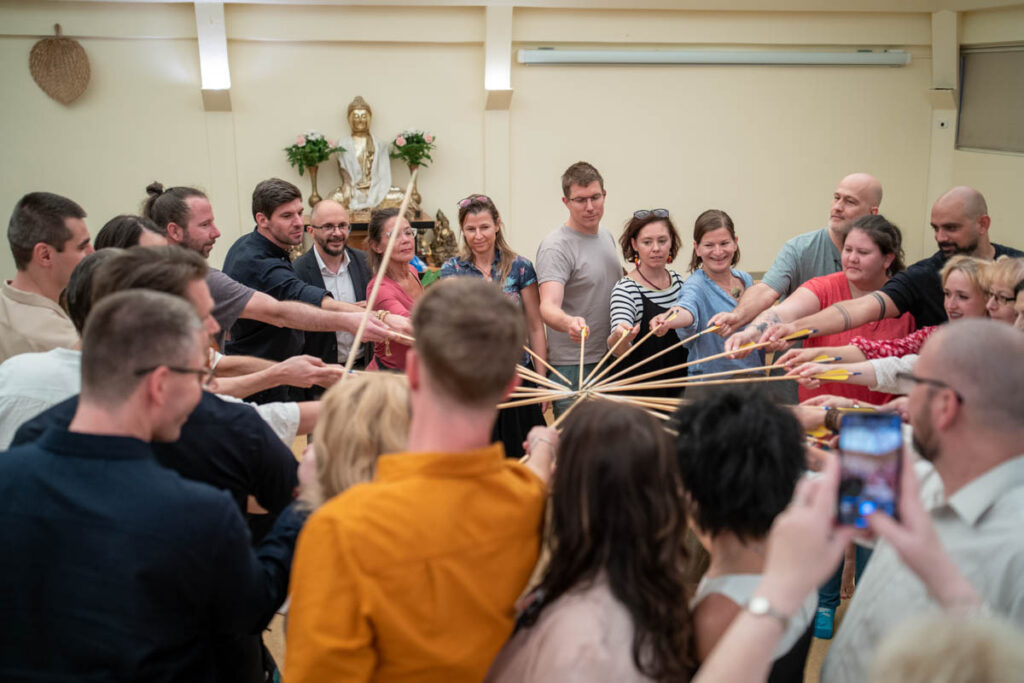
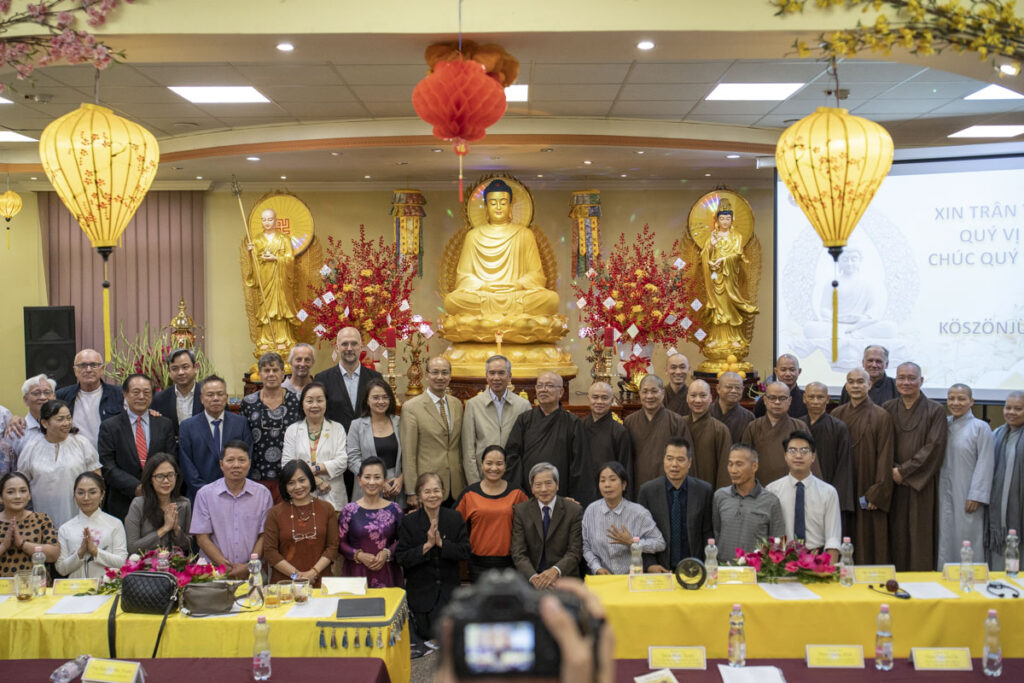
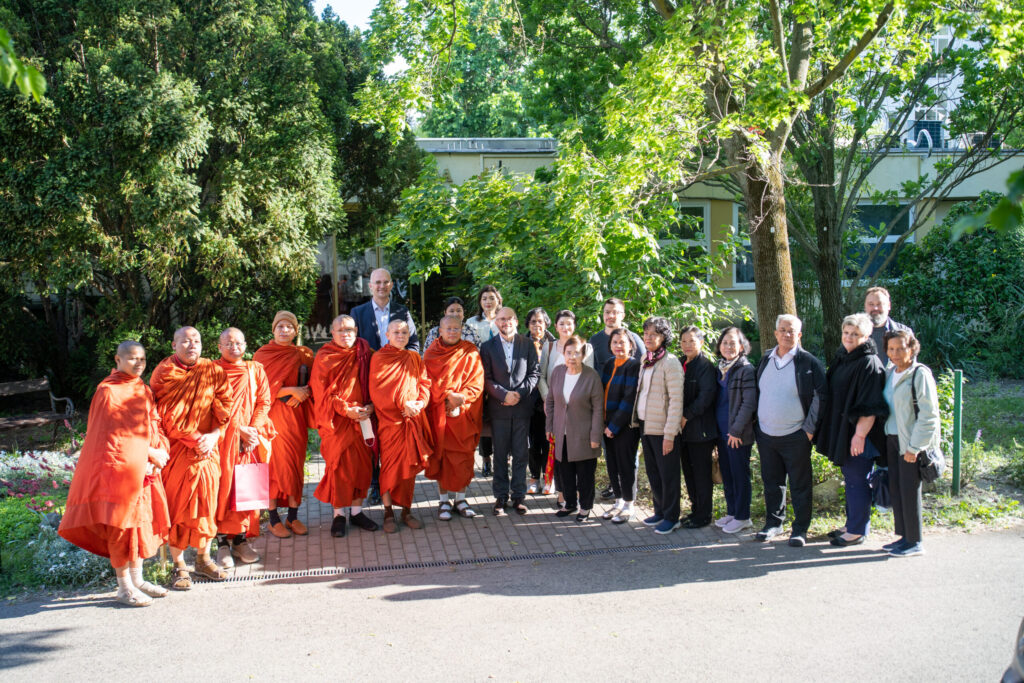
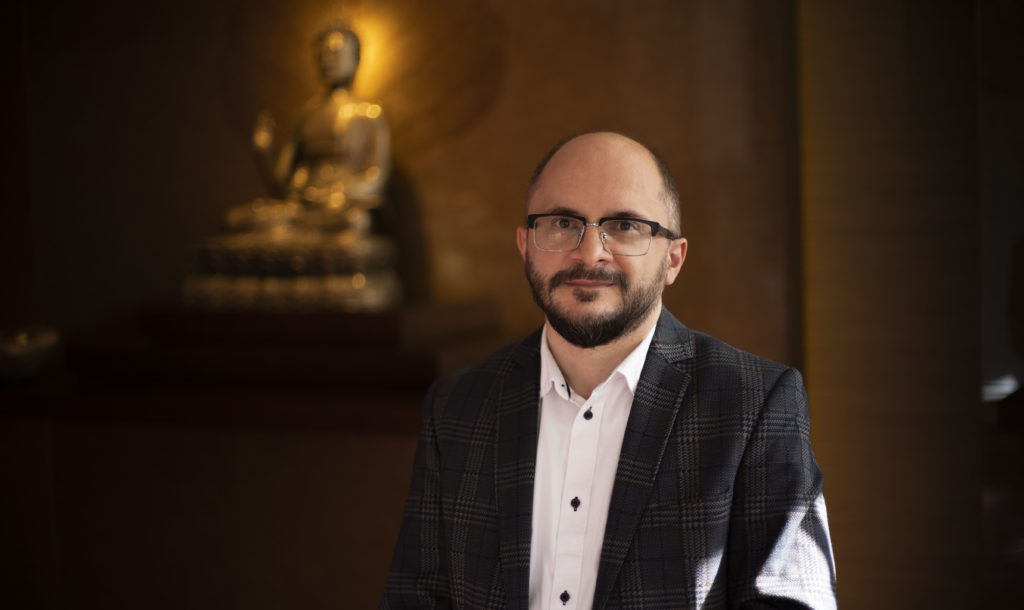
Gábor Karsai
Teacher and Rector at Dharma Gate Buddhist College
(History of Philosophy, Philosophy of Consciousness, Process Philosophy, Philosophy of Nature, Metaphysics)
Philosophy
I have always been a great seeker, wishing to reach understanding. I studied philosophy, Ancient Greek, and Latin at the University of Szeged when I realized that some of my questions required further answers through other methods and in other places. This led me to apply to the College in 1995. I soon started teaching philosophy and Ancient Greek, while also studying philosophy and Indology at ELTE University. At the College, starting in 1998, László Fórizs and I began researching Whitehead’s process philosophy, translating his major work Process and Reality into Hungarian (2001). I founded an association, became a department head at the College, researched the transcendence of experience in the phenomenological philosophy doctoral program at ELTE, and was elected rector of the College in 2005.
Leadership
In 2008, a radical shift occurred in my life: after leaving the College, I became a senior executive and CEO, driven by the realization, feeling, and motivation to apply my “practical philosophy” in real-world conditions. I led Hungarian companies as well as international organizations in Iceland, Switzerland, and Taiwan, including a Hungarian cultural center, a monastery renovated into a retreat center, a global leadership platform, a European educational foundation, and a Buddhist world organization. In 2018, after returning to Hungary, I was invited to return to the College as rector.
Leadership Philosophy
In 2005/2006 and 2019/2020, I successfully led smooth accreditations at the College with my colleagues, and I am proud to say that two of the four accreditations so far occurred under my leadership. Both in teaching and leadership, my fundamental principle is based on a “practical philosophy” that encourages understanding-creation, extensive collaborative thinking, and cooperation involving all stakeholders. Since 2021, I have also been leading the Mind & Life Europe organization alongside the College, paving the way for the College’s planned entry into the European scene. I consider myself a practicing Buddhist, philosopher, and bridge-building manager. For me, the spiritual and material, the theoretical and practical, are not separate. I experience the deepest Buddhist practice in diligent work: managing individual and collective problems, situations, and solving tasks often in changing circumstances. As Whitehead put it: “Philosophy may not neglect the multifariousness of the world — the fairies dance, and Christ is nailed to the cross.” In Buddhism, the practices of muditā (sympathetic joy) and karunā (compassion) have developed for these two aspects.
Date of Birth: 1974
I pursued my studies in multiple institutions and locations simultaneously:
Degrees:
• 1994–1997 – Latin Language Elective Program, József Attila Egyetem (JATE), Bölcsészet-tudományi Kar (József Attila University (JATE), Faculty of Humanities), Szeged.
• 1994–1998 – Ancient Greek Language and Literature Program, József Attila Egyetem (JATE), Bölcsészet-tudományi Kar (József Attila University (JATE), Faculty of Humanities), Szeged.
• 1996–2001 – Philosophy Program, Eötvös Loránd Tudományegyetem (ELTE), Bölcsészet-tudományi Kar, (Eötvös Loránd University (ELTE), Faculty of Humanities), Budapest.
Studies Without a Degree:
• 1992–1994 – Law Program, József Attila Egyetem (JATE), Jogtudományi Kar (József Attila University (JATE), Faculty of Law), Szeged.
• 1995–1997 – Buddhist Teacher Program (Classical Chinese and Sanskrit Specialization), Dharma Gate Buddhist College (TKBF), Budapest.
• 1997–2001 – Indology Program, Eötvös Loránd Tudományegyetem (ELTE), Bölcsészet-tudományi Kar (Eötvös Loránd University (ELTE), Faculty of Humanities), Budapest (Absolutorium).
Ph.D. Studies:
• 2001–2004 – Philosophy Doctoral Program, Phenomenology Subprogram, Eötvös Loránd Tudományegyetem (ELTE), Bölcsészet-tudományi Kar (Eötvös Loránd University (ELTE), Faculty of Humanities), Budapest (Absolutorium).
Position:
Dharma Gate Buddhist College, Assistant Professor, Rector (since 2019)
Academic Title:
Doctoral Absolutorium, Eötvös Loránd Tudományegyetem (ELTE), Bölcsészet-tudományi Kar (ELTE Faculty of Humanities), Philosophy Doctoral Program, 2004
Scientific and Professional Organizational Memberships:
Participation in the International Academic World:
Between 1998 and 2005, I was a participant and partly an organizer of major international Whitehead conferences:
Teaching Work:
• From 1996 to 2008, and then again from 2019 onwards, I have been a teacher at Dharma Gate Buddhist College. I primarily taught the history of philosophy and thematic philosophical subjects such as metaphysics, philosophy of nature, epistemology, philosophy of mind, philosophy of language, logic, philosophy of science, process philosophy, and phenomenology. Additionally, I conducted special courses such as Engaged Buddhism and Buddhism and Ecology.
Scientific Research Work:
• A. N. Whitehead’s Philosophy – Studied A. N. Whitehead’s philosophy, including the translation of his work Process and Reality, supported by the Országos Tudományos Kutatási Alap (OTKA) (National Scientific Research Fund (OTKA), 1997–2000 (supervised by László Fórizs).
• Process Philosophy and its Applications – Individual research program at the Center for Process Studies, Claremont, 1999–2000.
• Tulsīdas: Kavita-vālī – Processing the manuscripts of Kavita-vālī by Tulsīdas and preparing a critical edition, Eötvös Loránd Tudományegyetem, Összehasonlító Indoeurópai Nyelvtudományi Tanszék (Eötvös Loránd University, Department of Comparative Indo-European Linguistics), supported by the National Scientific Research Fund (OTKA), 2001–2005 (supervised by Imre Bangha).
• Tudat, elme, szubjektum, én (Consciousness, Mind, Subject, Self) – Research program at the East-West Research Institute at Dharma Gate Buddhist College, Mind Research Group, 2005–2007.
Habilitation:
• I successfully completed my habilitation in 2005 with the dissertation titled “Tapasztalás és transzcendencia” (Experience and Transcendence) as part of the internal habilitation process at Dharma Gate Buddhist College, which awarded me the rank of university professor.
Religious and Related Social Activities:
My religious activities are primarily characterized by my representation of interfaith dialogue, also known as ecumenism, as well as my active support for various religious causes (events, real estate acquisition, etc.), overall embodying the concept of karma yoga. In my personal religious practice, I have been engaged in daily meditation since 2013 (occasionally with yoga), mostly in solitude, though at times I have participated in organized retreats (e.g., in 2016–2017 at the Chan Buddhist monastery of the Venerable Hsin Tao Dharma Master in Taiwan) and, more recently, in Vipassana retreats (e.g., with the Venerable Dr. Khammai Dhammasami), which I continue to deepen.
From 1996 to 2008, I was an active member of the Dharma Gate Buddhist Church’s TeKi KaGyü community.
In 2010, with my support and involvement, the visit of His Holiness the Dalai Lama to Hungary and his teachings at the Papp László Budapest Sport Arena were realized.
In 2010–2011, I contributed to the acquisition of property for the Dhammadípa (Island of the Dharma) Community of Pál Farkas in Bajnai.
In 2010, I contributed to the development of the concept for TEDx Danubia and the establishment of the event series.
In 2011, I created and organized the “Sopronbánfalvi Ökumenikus Vallási Fesztivált”” (Sopronbánfalva Ecumenical Religious Festival), and the conference Világvallások a társadalomtudományok tükrében” (World Religions in the Reflection of Social Sciences) with participation from Dr. Asztrik Várszegi and Prof. Dr. Elemér Hankiss.
From 2016 to 2019, I was a member of the Higher Education Committee of the Dharma Gate Buddhist Church, and from 2018 to 2019, I served as its president.
Ultimately, I include the participation in the creation of the KOGART Holding concept and the vision for the Sopronbánfalva Monastery, the activities of the World Servers Foundation, especially the management of the Spirit of Humanity Forum, my contributions to the projects of the Education 4 Peace Foundation, the leadership of the Ling Jiou Mountain Buddhist Society, the support of the Elijah Interfaith Institute, and my involvement in Mind & Life Europe, along with the support of many other smaller and larger projects, in this context.
In recognition of my various activities supporting Hungarian and international Buddhism, I was awarded the honorary title of Dharma Teacher by the Dharma Gate Buddhist Church in 2018.
Studies:
Book Reviews:
Translations:
Editorial Work:
Lectures: